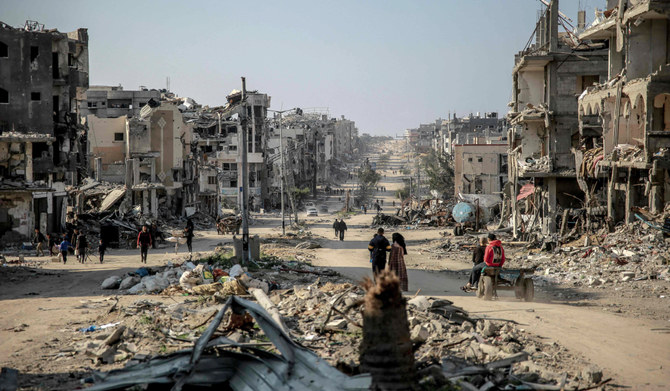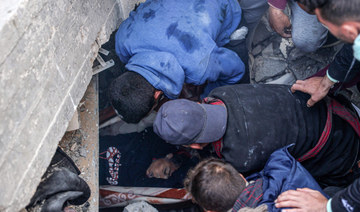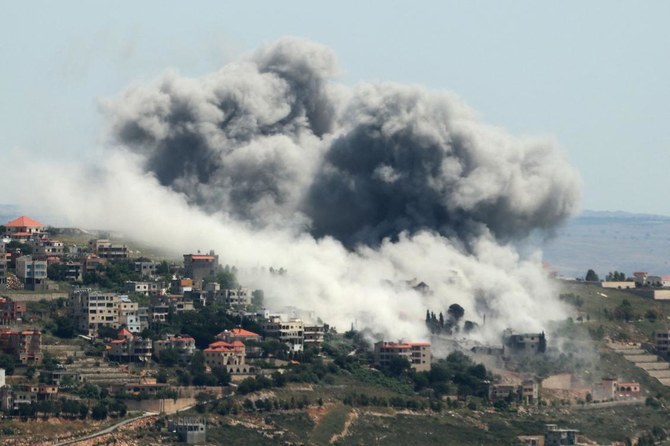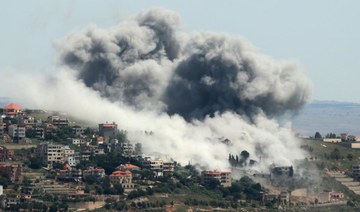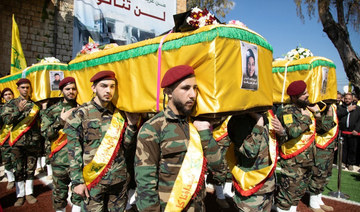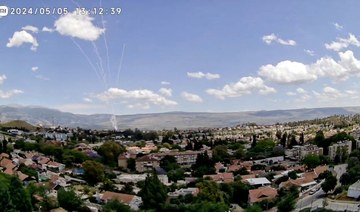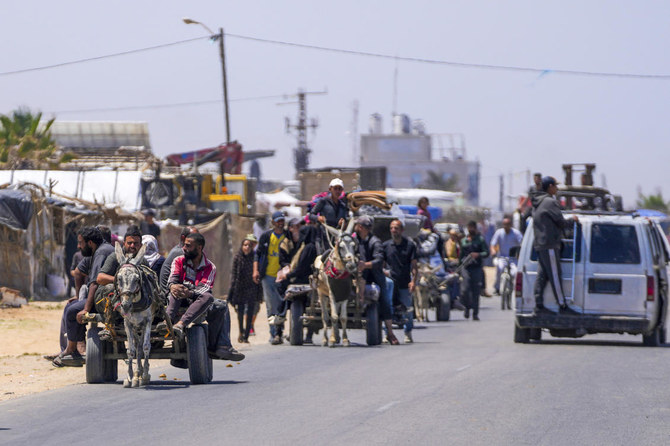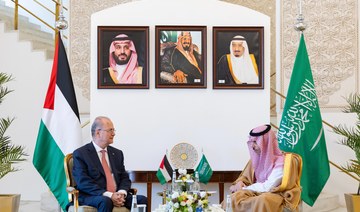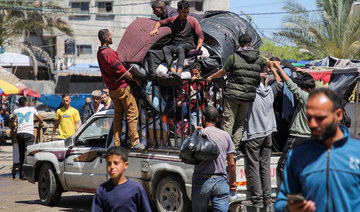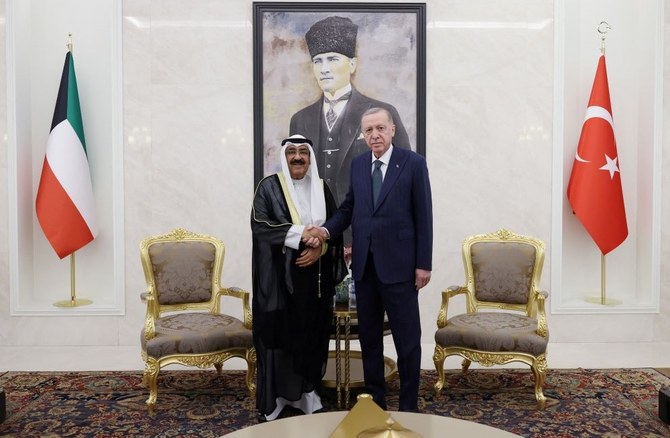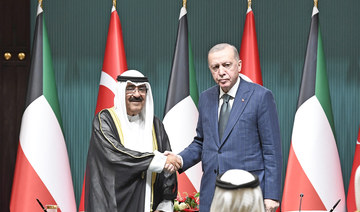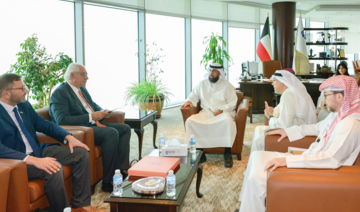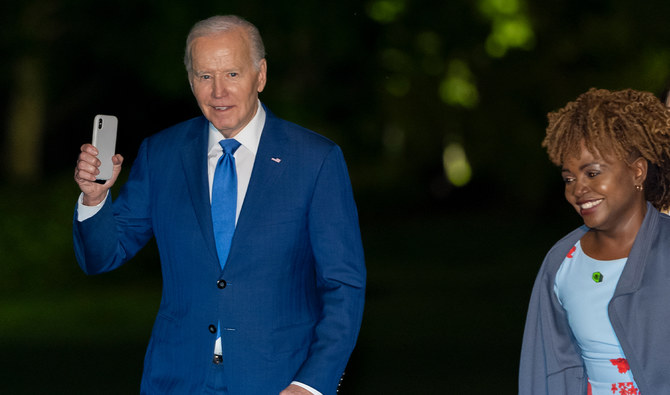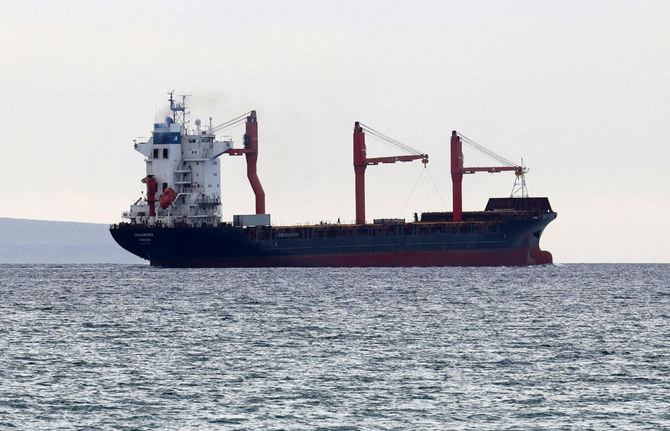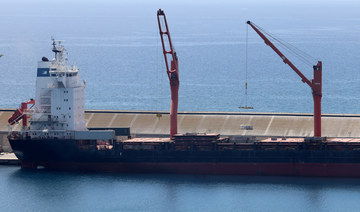RAMALLAH: The Palestinian Authority’s prime minister announced his government’s resignation on Monday, seen as the first step in a reform process urged by the United States as part of its latest ambitious plans to resolve the Israeli-Palestinian conflict.
But it will do little to address the authority’s longstanding lack of legitimacy among its own people or its strained relations with Israel. Both pose major obstacles to US plans calling for the PA, which administers parts of the Israeli-occupied West Bank, to govern postwar Gaza ahead of eventual statehood.
That’s assuming that the war in Gaza ends with the defeat of the Hamas militant group — an Israeli and US goal that seems elusive nearly five months into the grueling war that has killed almost 30,000 Palestinians and pushed the territory to the brink of famine.
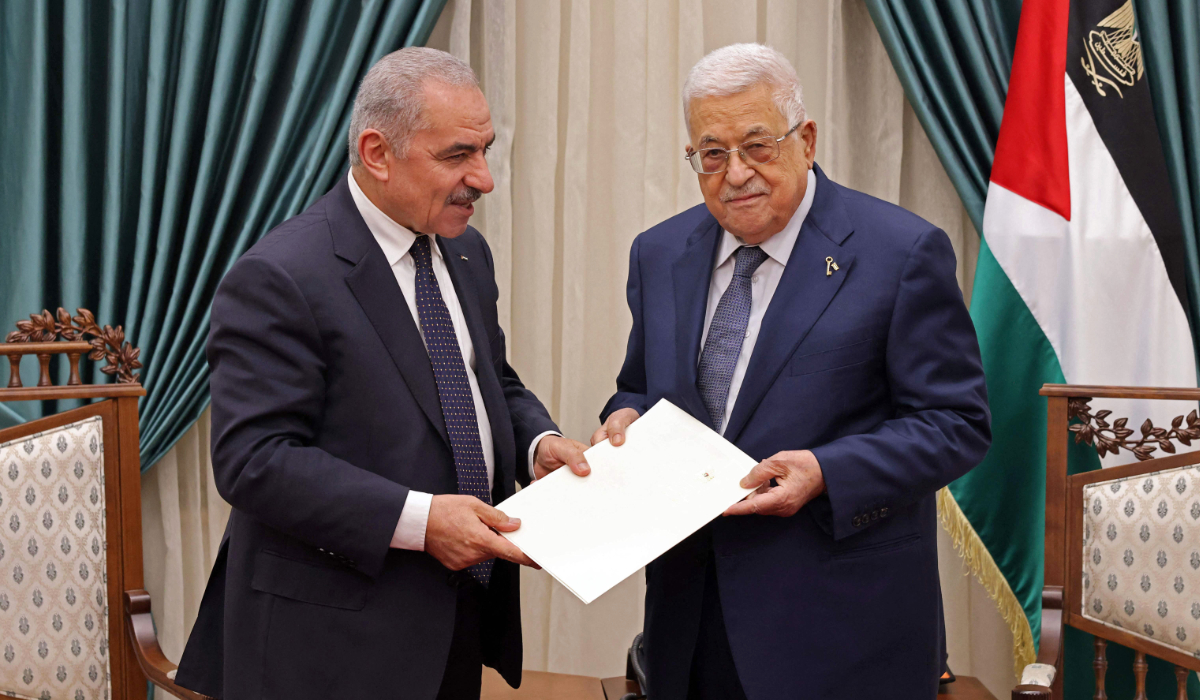
This handout picture provided by the Palestinian Authority's Press Office (PPO) shows Palestinian Prime Minister Mohammad Shtayyeh (L) presenting the resignation of his government to President Mahmud Abbas, in Ramallah on February 26, 2024. (AFP)
Here’s a look at the government shakeup and what it means for the Israel-Hamas war.
WHAT IS THE PALESTINIAN AUTHORITY?
The PA was created in the early 1990s through interim peace agreements signed between Israel and the Palestine Liberation Organization, then led by Yasser Arafat.
It was granted limited autonomy in parts of the West Bank and Gaza ahead of what the Palestinians hoped would be full statehood in both territories as well as east Jerusalem, lands that Israel captured in the 1967 Mideast war.
But the sides were unable to reach a final agreement through several rounds of peace talks. Mahmoud Abbas was elected president of the PA in 2005, months after Arafat’s death. Hamas won a landslide victory in parliamentary elections the following year, triggering an international boycott of the PA.
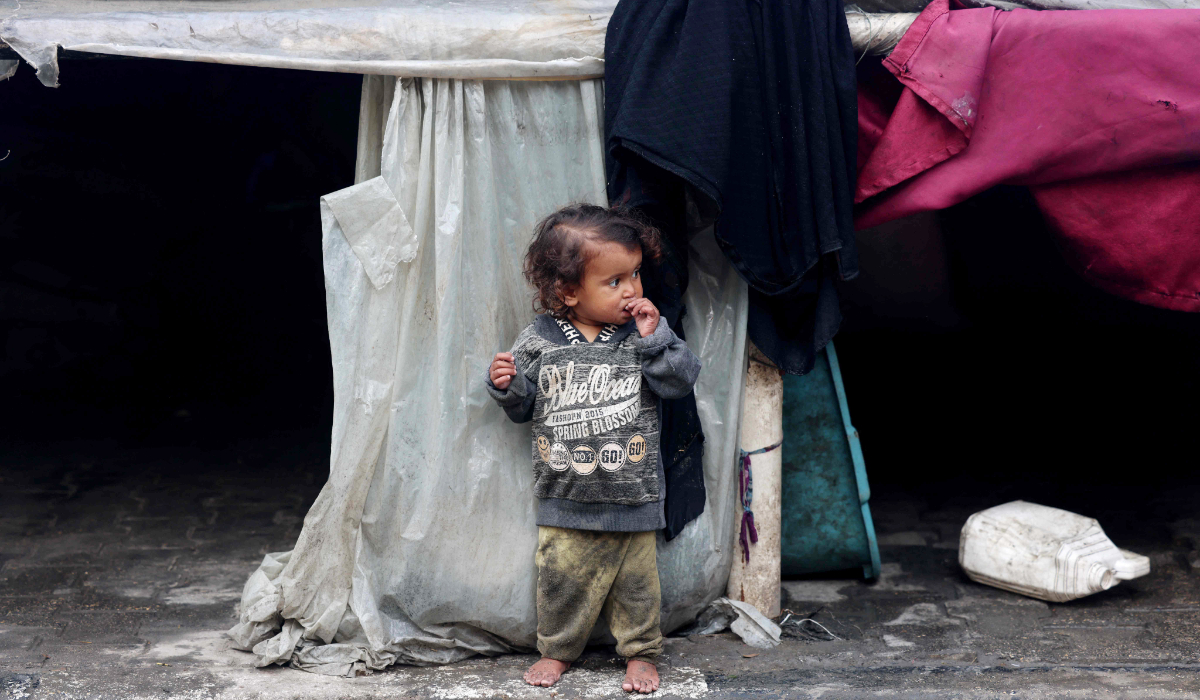
A displaced Palestinian child stands outside a makeshift tent attached to a school hosting families from other parts of the Gaza Strip in the Rafah refugee camp in southern Gaza on February 26, 2024, as battles between Israel and the Palestinian militant group Hamas continue for the fifth month. (AFP)
A power struggle between Abbas’ secular Fatah party and Hamas boiled over in the summer of 2007, with Hamas seizing power in Gaza after a week of street battles. That effectively confined Abbas’ authority to parts of the Israeli-occupied West Bank.
Abbas recognizes Israel, is opposed to armed struggle and is committed to a two-state solution. His security forces have cooperated with the Israeli military to crack down on Hamas and other armed groups, and his government has worked with Israel to facilitate work permits, medical travel and other civilian affairs.
WHAT DOES THE RESIGNATION MEAN?
In announcing his resignation, Prime Minister Mohammad Shtayyeh said new arrangements were needed to address “the new reality in the Gaza Strip.”
Abbas accepted Shtayyeh’s resignation and is expected to replace him with Mohammad Mustafa, a US-educated economist who has held senior positions at the World Bank and currently leads the Palestine Investment Fund. He was deputy prime minister and economy minister from 2013-2015.
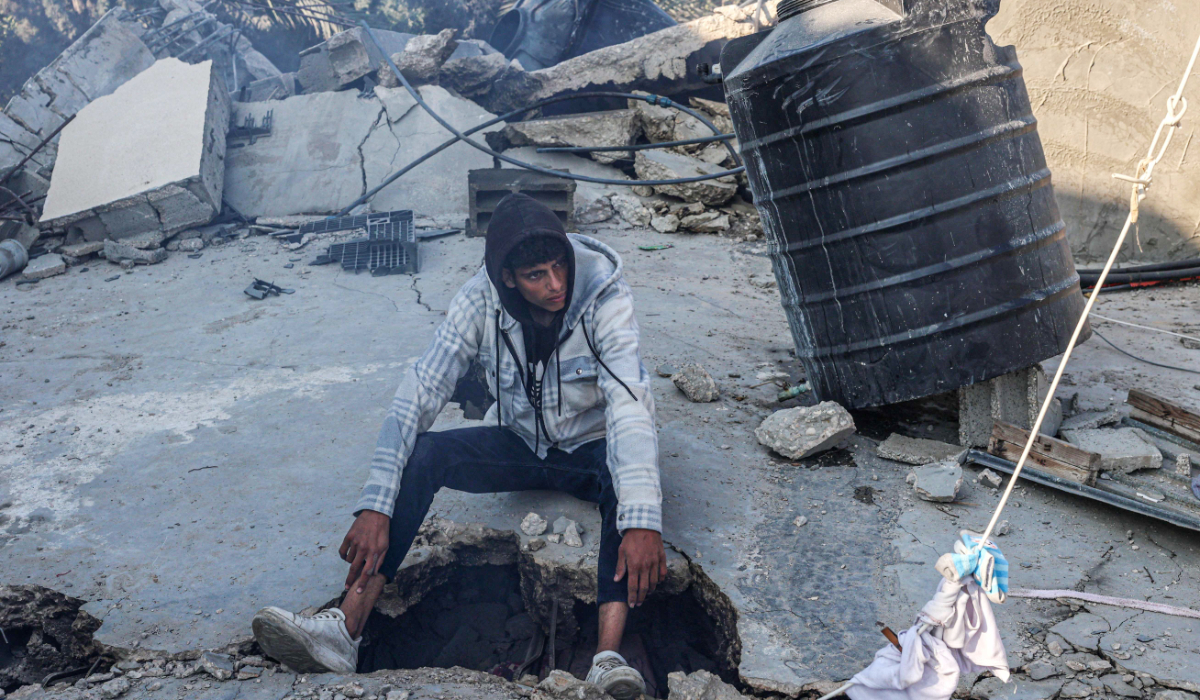
Palestinians search the rubble of their house destroyed in an overnight Israeli air strike in east Khan Yunis in the southern Gaza Strip on February 26, 2024, amid continuing battles between Israel and the Palestinian militant group Hamas. (AFP)
As a political independent and not a Fatah loyalist like Shtayyeh, Mustafa’s appointment would likely be welcomed by the US, Israel and other countries.
Mustafa has no political base of his own, and the 88-year-old Abbas will still have the final say on any major policies. Still, the appointment would convey the image of a reformed, professional PA that can run Gaza, which is important for the US
State Department spokesman Matthew Miller said it was up to the Palestinians to choose their leaders, but that the US welcomes any steps to “reform and revitalize” the PA.
“We think those steps are positive. We think that they’re an important step to achieving a reunited Gaza and West Bank under the Palestinian Authority.”
HOW DO PALESTINIANS VIEW THE AUTHORITY?
Abbas’ popularity has plummeted in recent years, with polls consistently finding that a large majority of Palestinians want him to resign. The PA’s security coordination with Israel is extremely unpopular, causing many Palestinians to view it as a subcontractor of the occupation.
Both the PA and Hamas have cracked down on dissent in the territories they control, violently suppressing protests and jailing and torturing critics. Abbas’ mandate expired in 2009 but he has refused to hold elections, citing Israeli restrictions.
Hamas, whose popularity has soared during this and previous rounds of violence, would likely do well in any free election.
But the most popular Palestinian leader by far is Marwan Barghouti, a Fatah leader who is serving five life sentences in an Israeli prison after a 2004 terrorism conviction.
Hamas is demanding his release in exchange for some of the hostages it captured in the Oct. 7 attack that ignited the war, but Israel has refused.
Hamas has called for all the Palestinian factions to establish an interim government to prepare the way for elections. But Israel, the US and other Western countries are likely to boycott any Palestinian body that includes the militant group, which they view as a terrorist organization.
DOES ISRAEL SUPPORT THE PALESTINIAN AUTHORITY?
Israel prefers the PA to Hamas. But even though they cooperate on security matters, Israel accuses the PA of inciting terrorism, and the PA accuses Israel of apartheid and genocide.
Israel’s criticism largely focuses on the PA’s provision of financial aid to the families of Palestinian prisoners and Palestinians killed by Israeli forces — including militants who killed Israelis. Israel says the payments incentivize terrorism. The PA portrays them as social welfare for victims of the occupation.
Israeli Prime Minister Benjamin Netanyahu has said the PA should have no role in postwar Gaza. He says Israel will maintain open-ended security control over the territory while local Palestinian leaders administer civilian affairs. Netanyahu’s government is opposed to Palestinian statehood.
The US has outlined a path to a broader postwar settlement in which Saudi Arabia would recognize Israel and join other Arab states and a revitalized PA in helping to rebuild and govern Gaza — all in exchange for a credible path to an independent Palestinian state.
The reform of the PA represents a small part of that package, which has yet to win over the Israeli government.



